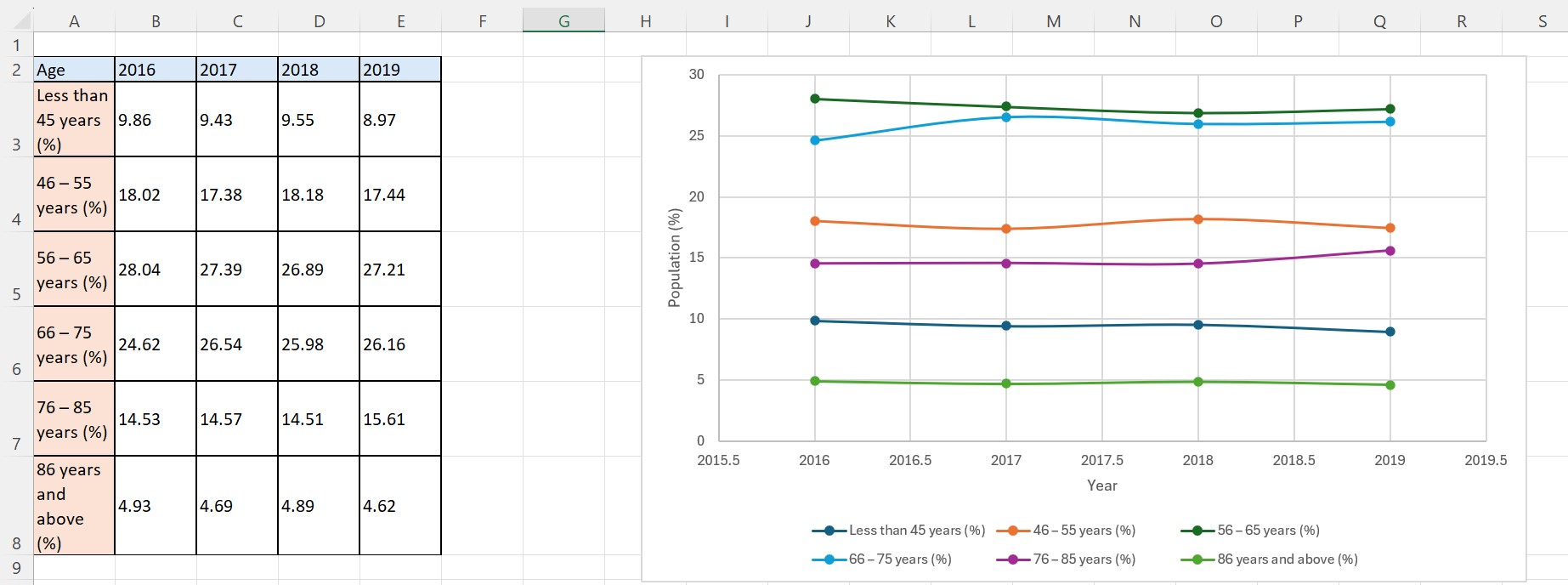Tuesday Poster Session
Category: Colorectal Cancer Prevention
P4773 - The Rising Trend of Metastatic Colorectal Cancer: A Hospital-Based Study Across Different Age Groups
Tuesday, October 28, 2025
10:30 AM - 4:00 PM PDT
Location: Exhibit Hall
- JG
Jasneet Gill, MBBS, MD (she/her/hers)
North Knoxville Medical Center
Knoxville, TN
Presenting Author(s)
Jasneet Gill, MBBS, MD1, Ayobami Olafimihan, MD2, Michael Leahy, MD3, Chimezie Mbachi, MD3
1North Knoxville Medical Center, Knoxville, TN; 2John H. Stroger, Jr. Hospital of Cook County, Chicago, IL; 3NORTH KNOXVILLE MEDICAL CENTER, Knoxville, TN
Introduction: Metastatic colorectal cancer (mCRC) represents a major public health challenge, characterized by high mortality rates and a rising incidence across diverse age groups. Historically, mCRC has predominantly affected older adults (ages ≥ 65); however, recent studies indicate a concerning increase in cases among younger individuals. This demographic shift necessitates the implementation of improved screening, preventive strategies and formulating effective management to address the unique needs of different populations.
Methods: A retrospective analysis of the National Inpatient Sample (NIS) database from 2016 to 2019 revealed variations in the prevalence of mCRC across various age groups. Inclusion criteria encompassed all age groups (< 45 to > 76 years), allowing for comprehensive demographic analysis. A slight increase in prevalence was noted in the 66 - 75 years group, from 24.62 % to 26.54 %. Statistical analysis was conducted using SPSS software, utilizing descriptive statistics to summarize data, ANOVA to compare prevalence across years, and linear regression to identify significant temporal trends.
Results: A total of 426,025 cases with the diagnosis of mCRC from age ≤ 45 years to ≥ 76 years were analyzed in this study. A total of 73,070 cases were seen in the 66 - 75 years group, with a statistically significant upward temporal trend with linear regression ( p < 0.05) from years 2016 to 2019. Additionally, patients ≤ 45 years and those ≥ 76 years accounted for 29 % of the mCRC population, both of which currently lack specific screening guidelines.
Discussion: The rising incidence of mCRC among individuals aged 66 to 75 years underscores the urgent need for enhanced screening protocols. While decreasing the age from 50 to 45 years for screening initiation per the new guidelines is a step forward, there is still significant work to be done. Special attention is required for individuals ≤ 45 and ≥ 76, who together represent nearly 29 % of mCRC cases. Current guidelines may not adequately address compliance issues, particularly with colonoscopies. Future advancements, such as ctDNA testing, liquid biopsies and other innovative screening methods, offer promising solutions to improve patient compliance and early detection, ultimately reducing the burden of mCRC. Tailored strategies and technological integration are key to refining screening practices and improving patient outcomes.

Figure: Metastatic CRC Trend by Age.
Disclosures:
Jasneet Gill indicated no relevant financial relationships.
Ayobami Olafimihan indicated no relevant financial relationships.
Michael Leahy indicated no relevant financial relationships.
Chimezie Mbachi indicated no relevant financial relationships.
Jasneet Gill, MBBS, MD1, Ayobami Olafimihan, MD2, Michael Leahy, MD3, Chimezie Mbachi, MD3. P4773 - The Rising Trend of Metastatic Colorectal Cancer: A Hospital-Based Study Across Different Age Groups, ACG 2025 Annual Scientific Meeting Abstracts. Phoenix, AZ: American College of Gastroenterology.
1North Knoxville Medical Center, Knoxville, TN; 2John H. Stroger, Jr. Hospital of Cook County, Chicago, IL; 3NORTH KNOXVILLE MEDICAL CENTER, Knoxville, TN
Introduction: Metastatic colorectal cancer (mCRC) represents a major public health challenge, characterized by high mortality rates and a rising incidence across diverse age groups. Historically, mCRC has predominantly affected older adults (ages ≥ 65); however, recent studies indicate a concerning increase in cases among younger individuals. This demographic shift necessitates the implementation of improved screening, preventive strategies and formulating effective management to address the unique needs of different populations.
Methods: A retrospective analysis of the National Inpatient Sample (NIS) database from 2016 to 2019 revealed variations in the prevalence of mCRC across various age groups. Inclusion criteria encompassed all age groups (< 45 to > 76 years), allowing for comprehensive demographic analysis. A slight increase in prevalence was noted in the 66 - 75 years group, from 24.62 % to 26.54 %. Statistical analysis was conducted using SPSS software, utilizing descriptive statistics to summarize data, ANOVA to compare prevalence across years, and linear regression to identify significant temporal trends.
Results: A total of 426,025 cases with the diagnosis of mCRC from age ≤ 45 years to ≥ 76 years were analyzed in this study. A total of 73,070 cases were seen in the 66 - 75 years group, with a statistically significant upward temporal trend with linear regression ( p < 0.05) from years 2016 to 2019. Additionally, patients ≤ 45 years and those ≥ 76 years accounted for 29 % of the mCRC population, both of which currently lack specific screening guidelines.
Discussion: The rising incidence of mCRC among individuals aged 66 to 75 years underscores the urgent need for enhanced screening protocols. While decreasing the age from 50 to 45 years for screening initiation per the new guidelines is a step forward, there is still significant work to be done. Special attention is required for individuals ≤ 45 and ≥ 76, who together represent nearly 29 % of mCRC cases. Current guidelines may not adequately address compliance issues, particularly with colonoscopies. Future advancements, such as ctDNA testing, liquid biopsies and other innovative screening methods, offer promising solutions to improve patient compliance and early detection, ultimately reducing the burden of mCRC. Tailored strategies and technological integration are key to refining screening practices and improving patient outcomes.

Figure: Metastatic CRC Trend by Age.
Disclosures:
Jasneet Gill indicated no relevant financial relationships.
Ayobami Olafimihan indicated no relevant financial relationships.
Michael Leahy indicated no relevant financial relationships.
Chimezie Mbachi indicated no relevant financial relationships.
Jasneet Gill, MBBS, MD1, Ayobami Olafimihan, MD2, Michael Leahy, MD3, Chimezie Mbachi, MD3. P4773 - The Rising Trend of Metastatic Colorectal Cancer: A Hospital-Based Study Across Different Age Groups, ACG 2025 Annual Scientific Meeting Abstracts. Phoenix, AZ: American College of Gastroenterology.
